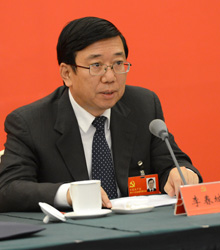| Provincial Official Investigated
 |
|
(XINHUA) |
Li Chuncheng, Deputy Secretary of the Sichuan Provincial Committee of the Communist Party of China (CPC), is under investigation for alleged discipline violation, according to the CPC Central Commission for Discipline Inspection in early December.
Li, 56, is the first provincial- and ministerial-level official investigated after the 18th CPC National Congress held on November 8-14. He was elected as an alternate member of the 18th CPC Central Committee at the congress.
Pomp Ban
In a meeting of the Political Bureau of the Communist Party of China (CPC) Central Committee on December 4, Party leaders pledged to reject extravagance and reduce bureaucratic visits and meetings.
The meeting adopted a document making explicit requirements on how CPC Political Bureau members should improve their work style in eight aspects.
"There should be fewer traffic controls arranged for the leaders' security of their trips to avoid unnecessary inconvenience to the public, and inspection tours as a mere formality should be strictly prohibited," said a statement of the meeting.
Political Bureau members are not allowed to attend any sorts of ribbon-cutting or cornerstone-laying ceremonies, nor celebrations and seminars, unless they get approval from the CPC Central Committee, according to the statement.
Officials' visits abroad should only be arranged when needed in terms of foreign affairs with fewer accompanying members, and on most of the occasions, there is no need for a reception by overseas Chinese people, institutions and students at the airport.
It was also agreed at the meeting to strictly regulate the arrangements of national official meetings and major events, and improve the efficiency of official conferences and issuing of official documents.
Party leaders also urged senior officials to maintain a frugal lifestyle and strictly comply with regulations on housing and vehicles.
Land Reclamation
The Ministry of Land and Resources is expected to issue measures on land reclamation in mining areas and has finished collecting public feedback.
China promulgated the Land Restoration Regulation in February 2011. The country's 1,500-plus mining areas occupy about 2 million hectares of land, and the figure is expanding by 33,000 to 47,000 hectares annually, according to ministry statistics.
The land reclamation rate is merely 15 percent, far below the international level, which mainly stands at around 50 to 70 percent.
Land destroyed near coal mines makes up about 80 percent of the total ruined by all kinds of mining. Thus, future efforts will mainly focus on coal mine areas, said Hu Zhenqi, Secretary General of the Land Reclamation and Ecological Restoration Committee of the China Coal Society.
Monastic Ceremony
The 11th Panchen Lama conducted a ritual with Tibetan Buddhism scholars, all monks at the High-level Tibetan Buddhism College of China, in Beijing on December 5.
Eleven of the monks in attendance graduated from the school on December 4, receiving the Tho Ram Pa degree, one of the highest academic degrees in Tibetan Buddhism.
The monks received their degrees after passing a six-day exam, defending their dissertations and being interviewed by a panel made up of distinguished monks.
The Tho Ram Pa degree system was launched in 2004 in an effort to improve the study of Tibetan Buddhism and the training of outstanding monks by incorporating elements of modern education.
Underground Palace
The remains of a massive "imperial palace" have been uncovered at the mausoleum of China's first emperor, Qin Shi Huang, archaeologists said on December 1.
Sun Weigang, an associate researcher at the Shaanxi Provincial Institute of Archaeology, said that based on its foundations, the courtyard-style palace was estimated to be 690 meters long and 250 meters wide.
Covering an area of 170,000 cubic meters, the palace is nearly one fourth the size of the Forbidden City in Beijing, the imperial palace of China's last two feudal dynasties, the Ming (1368-1644) and Qing (1644-1911), Sun said.
The palace, the largest complex yet unearthed at the site, includes 18 courtyard houses and a main building that overlooked the houses, according to the researcher.
The mausoleum of Qin Shi Huang is best known for its "garrison," the Terracotta Army.
Fight Against Polio
A commission under the World Health Organization (WHO) announced in Beijing on November 30 that China retains its polio-free status, having eradicated an outbreak in 2011.
After more than 10 years of being labeled as a "polio-free" country, China confirmed four cases of wild poliovirus infection in Xinjiang Uygur Autonomous Region on August 25, 2011. The last case was reported on October 9, 2011, bringing the total count to 21, including two deaths, according to the Ministry of Health.
Upon request, WHO labs later found the poliovirus was imported from neighboring Pakistan, where the disease remains endemic.
The Chinese Government promptly launched emergency response plans and a massive vaccination campaign, according to a report issued at the closing session of a four-day meeting of the WHO Regional Commission for the Certification of Poliomyelitis Eradication.
The ministry confirmed that over 43 million people in Xinjiang have been vaccinated.
Investigation and response actions undertaken in China in 2011 should serve as models for any other outbreak following importation globally, said the report.
Charity Volunteer System
The Red Cross Society of China (RCSC) will improve its volunteer system in a bid to expand the country's volunteer participation rate, according to a conference held on December 5, International Volunteer Day.
Zhao Baige, Executive Vice President of the RCSC, said that the RCSC will give full play to the roles of volunteers based on their professions and fields and improve the capabilities of volunteers at the community level.
The RCSC will establish an online information platform covering provincial-level volunteer programs, Zhao said, adding that the platform can better protect volunteers' rights. | 